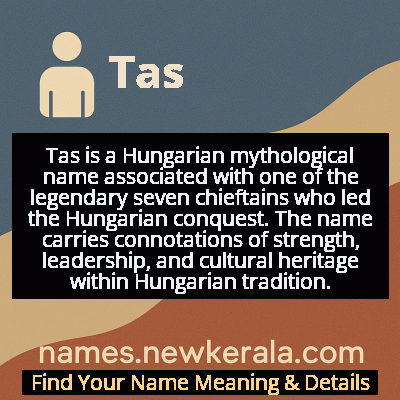Tas Name Meaning & Details
Origin, Popularity, Numerology Analysis & Name Meaning of Tas
Discover the origin, meaning, and cultural significance of the name TAS. Delve into its historical roots and explore the lasting impact it has had on communities and traditions.
Name
Tas
Gender
Male
Origin
Hungarian
Lucky Number
4
Meaning of the Name - Tas
Tas is a Hungarian mythological name associated with one of the legendary seven chieftains who led the Hungarian conquest. The name carries connotations of strength, leadership, and cultural heritage within Hungarian tradition.
Tas - Complete Numerology Analysis
Your Numerology Number
Based on Pythagorean Numerology System
Ruling Planet
Uranus (Rahu)
Positive Nature
Strong sense of order, loyal, practical, and disciplined.
Negative Traits
Stubborn, overly serious, rigid, and prone to feeling restricted.
Lucky Colours
Blue, gray.
Lucky Days
Saturday.
Lucky Stones
Blue sapphire.
Harmony Numbers
1, 7, 8.
Best Suited Professions
Managers, engineers, accountants, organizers.
What People Like About You
Dependability, discipline, practicality.
Famous People Named Tas
Tas son of Lél
Legendary Hungarian chieftain
One of the seven chieftains who led the Hungarian conquest of the Carpathian Basin
Tas of the Becse kindred
Noble warrior
Prominent figure in early Hungarian chronicles, known for military leadership
Tas from the Gesta Hungarorum
Mythical hero
Featured in chronicles as a brave warrior during the Hungarian conquest
Name Variations & International Equivalents
Click on blue names to explore their detailed meanings. Gray names with will be available soon.
Cultural & Historical Significance
Throughout Hungarian history, the name has maintained its cultural resonance as a symbol of ancestral strength and cultural continuity. In folklore and historical narratives, Tas is portrayed as a noble figure whose legacy extends beyond military prowess to include wisdom and strategic thinking. The name's enduring presence in Hungarian consciousness reflects the importance of mythological figures in preserving cultural memory and national pride, serving as a reminder of Hungary's unique historical journey and the values that have sustained the nation through centuries of change.
Extended Personality Analysis
Individuals bearing the name Tas are typically characterized by a unique combination of quiet strength and strategic intelligence. Drawing from the mythological associations, they often possess a calm, composed demeanor that conceals deep determination and resilience. These individuals tend to be natural leaders who inspire confidence through their steady presence and reliable nature rather than overt charisma. They approach challenges with careful consideration and practical wisdom, making them effective problem-solvers in both personal and professional contexts.
The mythological Tas was known for his loyalty and commitment to his people, traits that continue to be associated with modern bearers of the name. They typically demonstrate strong family values and community orientation, often serving as stabilizing influences in their social circles. Their leadership style tends to be collaborative rather than authoritarian, valuing the input of others while maintaining clear direction. The combination of inner strength and outward calm makes Tas individuals particularly effective in crisis situations, where their ability to remain level-headed while taking decisive action becomes most valuable.
Modern Usage & Popularity
In contemporary Hungary, Tas maintains a distinctive position as a name that bridges ancient mythology with modern identity. While it never appears among the top 100 most popular names, it enjoys consistent usage among families with strong connections to Hungarian heritage and history. The name experiences periodic revivals during cultural movements that emphasize national traditions and historical awareness. Modern usage often reflects a conscious choice to honor ancestral roots rather than follow fleeting naming trends, making it particularly common in families with generational ties to specific regions or historical awareness. The name's rarity in contemporary times adds to its distinctive quality, often chosen by parents seeking a unique yet culturally meaningful name that carries the weight of Hungarian mythological tradition.
Symbolic & Spiritual Meanings
Symbolically, the name Tas represents the enduring connection between past and present, embodying the qualities of foundational leadership and cultural continuity. It symbolizes the quiet strength that underpins lasting achievements and the wisdom to balance action with contemplation. The name carries connotations of heritage preservation and national identity, serving as a living link to Hungary's mythological origins. Tas represents the ideal of the peaceful warrior - someone who possesses the capacity for decisive action but prefers resolution through wisdom and strategy. This symbolic meaning extends to concepts of legacy, tradition, and the importance of remembering one's roots while navigating contemporary challenges. The name embodies the Hungarian cultural values of resilience, loyalty, and the quiet determination that has characterized the nation's historical journey.

